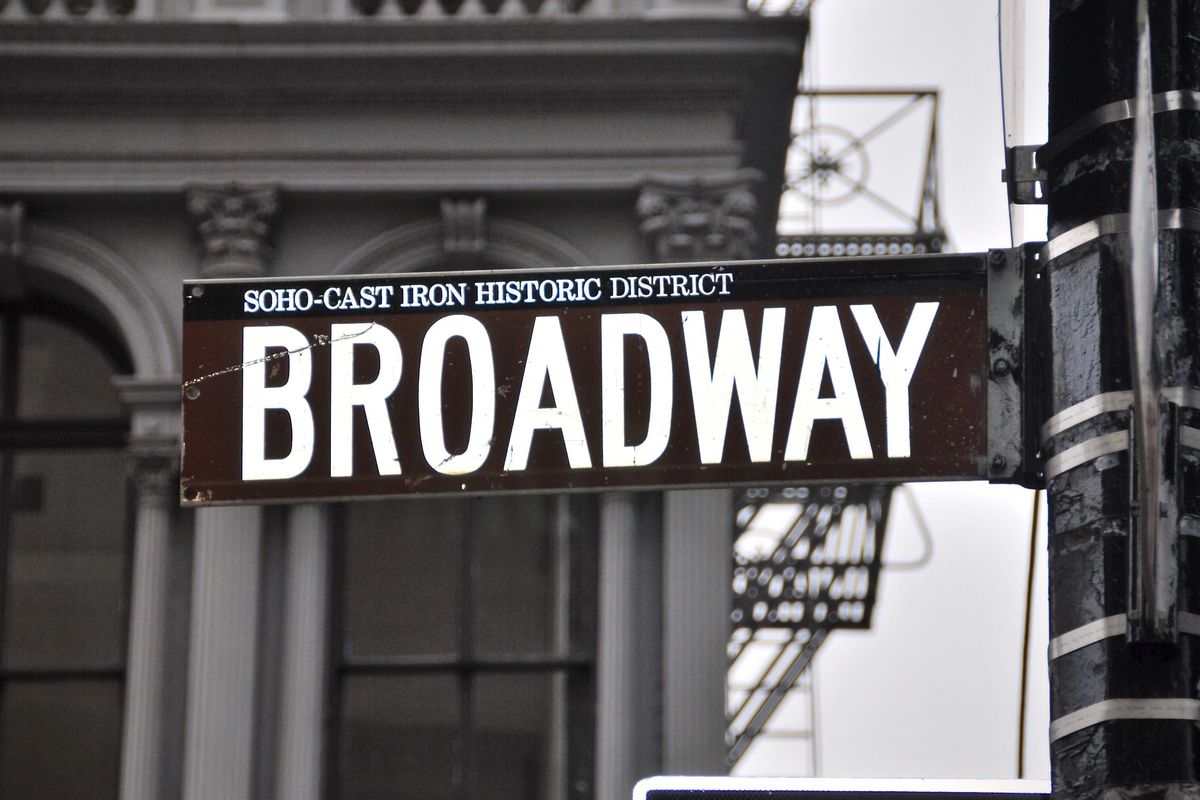19 musicals that are not only catchy—they could help with dementia, according to science
Back in 2013, researchers in the U.S. stumbled upon a novel new treatment for dementia patients: listening to show tunes. Seriously.

A picture taken of the Broadway street sign in New York City.
Back in 2013, researchers in the U.S. stumbled upon a novel new treatment for dementia patients: listening to show tunes. Seriously.
A study of nursing home patients found that residents who sang show tunes — specifically from "Oklahoma!" "The Wizard of Oz," and "The Sound of Music" — demonstrated increased mental performance, according to a report in the New York Daily News:
"Researchers working with elderly residents at an East Coast care home found in a four-month long study ... that people who sang their favorite songs showed a marked improvement compared to those who just listened."
A similar study in Finland, cited in The Guardian, demonstrated that singing not only helped dementia patients feel better and focus, but actually improved certain types of memory as well.
Even better? There are tons of classic show tunes specifically about remembering.
Here are 23 tunes every Broadway fan needs to memorize for the day when it's not so easy to remember. It'll help to start brushing up now.
1. The one about remembering the good old days.
"Those Were the Good Old Days," "Damn Yankees"
If you're the devil in "Damn Yankees," that means the Great Depression, the Black Plague years, and when Jack the Ripper was running around. Good times!
2. The one about remembering a parade that probably never happened.
Any playlist of show tunes about memory has to include this standard from "The Music Man," in which Professor Harold Hill remembers the best day of his life, when "Gilmore, Liberati, Pat Conway, The Great Creatore, W.C. Handy, and John Phillip Sousa all came to town."
Whether or not any of it actually happened is ... up for debate, to put it mildly.
3. The one about remembering a really fun trip you took to a medium-sized Midwestern city.
"Kansas City," "Oklahoma"
"Oklahoma's" Will Parker is so psyched about his Kansas City vacation he can't help bragging about it to all the other cowboys. And why not? It's a neat city! Have you been to Joe's Kansas City Barbecue? Neither has Will Parker, since he was there in 1906, but you should totally go.
4. The one about remembering how fun it was to murder that guy that one time...
"Cell Block Tango," "Chicago"
...while glancing nervously over your shoulder to make sure Queen Latifah isn't around.
5. The one about remembering the questionable choices it's too late to go back in time and not make.
"Where Did We Go Right?" from "The Producers"
Looking back doesn't always go well for characters in musicals. It definitely doesn't for "The Producers'" Bialystock and Bloom, as they tear around their office wondering how their incompetently directed, poorly acted, aggressively pro-Hitler musical wound up becoming a massive hit despite their every attempt to make it fail.
6. The one about remembering the little things.
"I Remember/Stranger Than You Dreamt It," "Phantom of the Opera"
Perhaps the greatest testament to how emotionally transporting "Phantom of the Opera" is: Christine, removing the phantom's mask for the first time, can just straight-up claim to remember mist — like, one mist in particular — and no one calls her on it ever.
7. The one about remembering the worst day of your life.
"The Barber and his Wife," "Sweeney Todd"
No character in musical theater is more nostalgic than Sweeney Todd, who, just moments after we meet him, croons this delightful ditty reminiscing about the time he was framed for a crime he didn't commit and banished from England so that an evil judge could rape his wife who subsequently poisoned herself.
A tune you can hum!
8. The one about remembering things differently than everyone else around you.
"Satisfied," "Hamilton"
Not sure if you've heard, but "Hamilton" is good, you guys.
After Alex and Eliza Schuyler meet and fall in love in "Helpless," Angelica Schuyler basically goes "Wicked" on her sister's song, recalling how agonizing it was watching her sister and the man who she herself is super into get together. But she sucks it up and buries it! Older siblings are the best.
9. The one about remembering that cute girl you just met like five seconds ago.
"Maria," "West Side Story"
A classic from "West Side Story." Sure, it's about remembering a meet-cute that literally just happened — Tony and Maria's orchestral-swell-assisted gaze across a crowded gym — but Tony is super jazzed about it, so it makes the list.
Gosh, I sure hope those crazy kids work out!
10. The one about remembering all the worst things from when you were a kid, and one kind-of-OK thing.
"At the Ballet," "A Chorus Line"
The ballet isn't that great, but it's better than devastating childhood trauma. Score one for the ballet! Thanks, "A Chorus Line!"
11. The one about remembering old hobbies.
"Dentist!" from "Little Shop of Horrors"
"Little Shop of Horrors'" Orin Scrivello, DDS, is just misunderstood. I mean, who among us didn't "shoot puppies," "poison guppies," or "take a pussycat and bash in its head" now and again as a kid? The '50s were a simpler time!
12. The one about remembering watching a dude die on the battlefield and feeling feelings about it.
"Momma Look Sharp," "1776"
47 years before "Hamilton" brought us the swaggery, ass-kicking side of the Revolutionary War, "1776" tore our guts out with this song, in which a courier to the Continental Congress recalls watching a mother comfort a young soldier as he dies at the battles of Lexington and Concord.
Hercules Mulligan does the guest rap. (Just kidding. There is no guest rap. It's just gorgeously somber for a while and then over.)
13. The one about remembering the best four years of your life.
"I Wish I Could Go Back to College," "Avenue Q"
Of course the sad-sack puppet man- and woman-children of "Avenue Q" want to go back to college! Who among us doesn't long for the days of term papers, humiliating romantic encounters, and crushing, debilitating debt? And meal-plan ice cream, too!
14. The one about remembering some A-plus advice from your best friend.
"Cabaret," "Cabaret"
Ladies and gentlemen, Sally Bowles from "Cabaret" is no fool! No matter how many lovers leave, or how much her career nosedives, or how nutty local politics get, she always remembers this important life lesson she learned from her good friend Elsie.
If only you had such a great, wise friend, maybe your outlook would be as good as Sally's. You could be so lucky!
15. The one about remembering last Christmas.
"Halloween," "Rent"
When it comes to the science of memory and cognition, "Rent" asks the big questions:
"Why are entire years strewn on the cutting room floor of memories? When single frames from one magic night forever flicker in close-up on the 3-D Imax of my mind?"
Poetic? Pathetic? We report, you decide.
16. The one about remembering everything and realizing how terrible it all was.
"Rose's Turn," "Gypsy"
Ah, yes. "Rose's Turn." The 11 o'clock number to end all 11 o'clock numbers in "Gypsy," the most musical of all musicals. Truly, there aren't many things more enjoyable than listening to Mama Rose replay the events of the last decade and change inside her own brain in a slow-motion nervous breakdown as the notion that her entire life has been completely worthless gradually dawns on her with ever-increasing dread.
Did I mention how fun musicals are?
Trivia time! You know that thing in music where trumpets go, "Ya da da da daaaa DA. Da DA da DA!" You know that thing? This is the song that thing comes from.
17. The one about remembering the first time you knew what you wanted to be when you grew up.
"Ring of Keys," "Fun Home"
There's nothing better than a song that makes you want to shout: "I am so glad I'm watching a musical instead of a basketball game right now." This moment in "Fun Home," where Alison recalls seeing a delivery woman — the first person who looked like the woman she felt like — is really, really one of them.
"This is a song of identification that is a turning moment, when you think you’re an alien and you hear someone else say, 'Oh, me too,'" composer Jeanine Tesori told Variety. "It’s a gamechanger for Alison. And that’s just Musical Theater 101."
...And the entire audience bursts into happy tears forever.
18. The one about remembering a nice dream you dreamed.
"I Dreamed a Dream," "Les Misérables"
When your life isn't going so great, it's good to remember the positive! Things didn't exactly go super well for Fantine in "Les Mis." But, hey, she had a pretty good dream once!
19. The one about remembering your single greatest regret and vowing to never remember it again.
"Turn It Off," "The Book of Mormon"
What's the ticket to living as fun-loving and guilelessly as the Mormon elders in "The Book of Mormon?" Don't just bury those traumatic, scary, impure memories — CRUSH THEM, OK?!
20. The one about remembering a really successful first date.
"Sarah Brown Eyes," "Ragtime"
Ah, young love. Even in "Ragtime," a musical that features racism, state violence, attempted child murder, and terrorism, at least we have this song, in which Coalhouse Walker Jr. recalls how he got his beloved Sarah to fall truly, madly, deeply in love with him with his peerless piano skills? So romantic.
Gosh, I sure hope those crazy kids work out!
21. The one about remembering a scary dream.
"Sit Down, You're Rockin' the Boat," "Guys and Dolls"
With, perhaps, only a smidge more credibility than grifter-from-another-mother Professor Harold Hill, "Guys and Dolls'" third-most-degenerate gambler Nicely-Nicely Johnson recalls a terrifying dream where he had to convince a group of skeptical evangelical crusaders that he's decided to give up the dice once and for all.
Side note: People in musicals are unbelievably good at remembering dreams. This is, like, full detail. I'd be like, "Um, I was at the Statue of Liberty, and you were there? I think? It wasn't really you, it was like a combination of you and my dad. And we were in prison. But at the Statue of Liberty."
22. The one about remembering how it used to be when you were young and full of hope instead of old and bitter and jaded.
"Our Time," "Merrily We Roll Along"
The closing number of "Merrily We Roll Along" is actually the first chronologically, since the musical goes backward. It's the play's happiest moment — Frank, Charley, and Mary on a roof watching Sputnik go by, giddily talking about how thrilling, perfect, and successful their futures are going to be. It's so hopeful! But so sad, 'cause you already know all the achingly bittersweet stuff that's going to happen.
Ach! So poignant! I'm dead from poignant.
23. The one about remembering.
"Memory," "Cats"
"Cats." The OG.
All right team, what did I miss?
This article originally appeared on 02.26.16
- A group of Broadway greats sang a triumphant tribute to Stephen Sondheim in Times Square - Upworthy ›
- 13-year-old's angelic rendition of 'Empty Chairs at Empty Tables' is bringing people to tears - Upworthy ›
- People are loving this musical theater kid's car singalongs - Upworthy ›
- Singer makes musical theater hits into acoustic folk ballads - Upworthy ›
- Julie Andrews said she literally could "feel the evil" when visiting the Von Trapp house - Upworthy ›
- Inside a Dutch 'dementia village' built for quality memory care - Upworthy ›
- Doctor shares 'dementia whiteboard' daughter wrote for mother - Upworthy ›
- Neuroscience says its great for older people to live in the past - Upworthy ›






 A woman is getting angry at her coworker.via
A woman is getting angry at her coworker.via  A man with tape over his mouth.via
A man with tape over his mouth.via  A husband is angry with his wife. via
A husband is angry with his wife. via 
 Austin Powers impersonator arrives at Chase Hofer's apartment.Photo Credit: Kenneth Webb, TikTok
Austin Powers impersonator arrives at Chase Hofer's apartment.Photo Credit: Kenneth Webb, TikTok
 Mom hugging crying daughter
Mom hugging crying daughter Dad kissing child on cheek
Dad kissing child on cheek Mom comforting daughter
Mom comforting daughter

 A blue light painting of an infinity symbol. Photo by
A blue light painting of an infinity symbol. Photo by